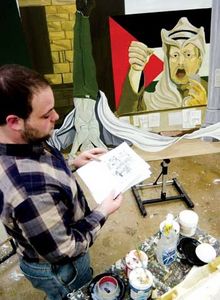For Penn State student Josh Stulman, years of hard work ended in disappointment yesterday when the university cancelled his upcoming art exhibit for violation of Penn State's policies on nondiscrimination, harassment and hate.
Three days before his 10-piece exhibit — Portraits of Terror — was scheduled to open at the Patterson Building, Stulman (senior-painting and anthropology) received an e-mail message from the School of Visual Arts that said his exhibit on images of terrorism "did not promote cultural diversity" or "opportunities for democratic dialogue" and the display would be cancelled.
The exhibit, Stulman said, which is based mainly on the conflict in Palestinian territories, raises questions concerning the destruction of Jewish religious shrines, anti-Semitic propaganda and cartoons in Palestinian newspapers, the disregard for rules of engagement and treatment of prisoners, and the indoctrination of youth into terrorist acts.
"I'm being censored and the reason for censoring me doesn't make sense," Stulman said.
Charles Garoian, professor and director of the School of Visual Arts, said Stulman's controversial images did not mesh with the university's educational mission.
The decision to cancel the exhibit came after reviewing Penn State's Policy AD42 [the policy, which, in my educated opinion, is clearly unconstutionally overbroad even if it actually applies to Stulman's exhibit, can be found here]: Statement on Nondiscrimination and Harassment and Penn State's Zero Tolerance Policy for Hate, he wrote.
....
[Stulman] said he was shocked at the university's decision to cancel the exhibit and that he has tried to meet with Garoian on numerous occasions to discuss his artwork.
"It's not about hate. I don't hate Muslims. This is not about Islam," Stulman said. "This is about terrorism impacting the Palestinian way of life and Israel way of life.
Thanks to Scholars for Peace in the Middle East for the heads-up.
UPDATE: Here is a photo of one of the pieces from the censored exhibit. It depicts is titled "Our Greatest Hero" and depicts Palestinian Nazi (I mean that literally) Haj Amin Al-Husseini, whom Yasser Arafat called "Our Greatest Hero."
Correction, from Mr. Stulman: The name of the painting in the picture is "Ramallah" and discusses the brutal treatment of Israeli soldiers in that specific area on at least several occasions including in 2002.

Related Posts (on one page):
- More on the Penn State Censorship Scandal:
- Penn State Backs Down
- Penn State Censorship--The Plot Thickens:
- Censorship at Penn State Update:
- Censoring "Portraits of Terror" at Penn State: